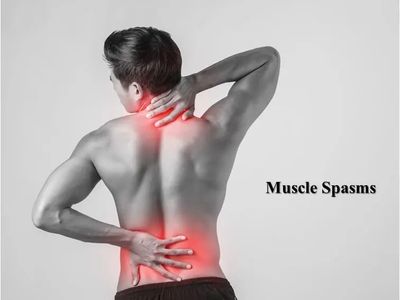Chronic Muscle Spasms: When to See a Doctor
 Diana Jenner
01 Feb, 2025
11 mins read
113
Diana Jenner
01 Feb, 2025
11 mins read
113

Muscle spasms, often referred to as cramps, are involuntary contractions of muscles that can range from mildly uncomfortable to intensely painful. In most cases, muscle spasms occur sporadically, such as after exercise or during sleep, and are relatively easy to manage with simple home remedies like stretching, hydration, and rest. However, when muscle spasms become chronic—frequent, persistent, and lasting over a long period—they can significantly impact your quality of life, raising concerns about underlying health issues.
While occasional muscle cramps are usually harmless and can be treated effectively at home, chronic muscle spasms may be a sign of something more serious that requires medical attention. In this blog, we will explore the potential causes of chronic muscle spasms, when you should seek medical help, and the treatment options available.
What Are Chronic Muscle Spasms?
Muscle spasms can be classified as acute or chronic, depending on their duration and frequency. Acute muscle spasms are isolated occurrences, usually brought on by overexertion, dehydration, or injury. Chronic muscle spasms, on the other hand, persist over a longer period, happening regularly or continuously. These spasms may occur even when you are at rest and can affect various muscles, including those in the legs, back, arms, and neck.
Chronic muscle spasms can be quite debilitating, causing discomfort, restricted movement, and sleep disturbances. They can interfere with your daily activities, making it difficult to engage in physical tasks, walk, or even relax.
Common Causes of Chronic Muscle Spasms
Chronic muscle spasms can arise from several different causes. While some of these factors are benign and manageable with lifestyle changes, others may indicate a more serious underlying medical condition that requires attention.
1. Dehydration and Electrolyte Imbalances
One of the most common causes of muscle spasms is dehydration, which occurs when your body loses more fluid than it takes in. When dehydrated, your muscles do not function optimally, and electrolyte imbalances, particularly low levels of potassium, calcium, and magnesium, can trigger muscle cramps. These types of spasms may become chronic if dehydration is not addressed or if electrolyte levels remain unbalanced.
2. Nutrient Deficiencies
A deficiency in certain nutrients can lead to muscle spasms. In particular, a lack of magnesium, potassium, or calcium can affect muscle function, causing involuntary contractions. For instance, low magnesium levels can interfere with muscle relaxation, while a potassium deficiency can disrupt the electrical signals that help muscles contract and relax.
3. Overuse or Muscle Fatigue
Excessive physical activity or overuse of certain muscle groups can lead to chronic spasms. This is particularly common in individuals who engage in high-intensity exercise without proper rest or stretching. Overworked muscles may become prone to cramping, especially if they are not given adequate time to recover between activities. Prolonged periods of physical stress can lead to chronic muscle spasms that can be difficult to relieve without rest and recovery.
4. Poor Circulation
Inadequate blood flow to muscles can contribute to muscle spasms. Conditions that affect circulation, such as peripheral artery disease (PAD), can cause muscles to cramp due to a lack of oxygen and nutrients. Poor circulation may result from underlying cardiovascular problems, such as narrowed blood vessels or heart disease, making it important to address the root cause of the circulatory issue to alleviate chronic muscle spasms.
5. Nerve Damage or Compression
Chronic muscle spasms can also be linked to nerve issues. Nerve damage, compression, or irritation—often caused by conditions like herniated discs, sciatica, or spinal stenosis—can lead to persistent muscle spasms. When nerves are compressed or damaged, they may send faulty signals to the muscles, triggering involuntary contractions. These spasms are often accompanied by other symptoms, such as numbness, tingling, or weakness in the affected area.
6. Underlying Medical Conditions
Certain medical conditions can lead to chronic muscle spasms. Conditions such as multiple sclerosis, Parkinson’s disease, diabetes, hypothyroidism, and fibromyalgia can all contribute to muscle spasms. These conditions affect the nervous system or muscle function, making individuals more prone to cramps and spasms. Additionally, some medications used to treat these conditions may also have muscle spasms as a side effect.
When to See a Doctor for Chronic Muscle Spasms
While muscle spasms are common and often temporary, there are times when they may indicate an underlying medical condition that requires professional attention. If you experience any of the following signs or symptoms along with your muscle spasms, it may be time to consult a doctor:
1. Frequent or Recurring Spasms
If you experience muscle spasms on a frequent or recurring basis—especially if they occur several times a day or last for an extended period—it may be a sign of an underlying condition that needs medical evaluation. Frequent spasms that interfere with daily activities or sleep should be investigated further.
2. Severe Pain or Discomfort
Chronic muscle spasms that are accompanied by severe pain, swelling, or tenderness may require medical attention. While mild cramps can usually be relieved with rest and hydration, intense pain that does not subside with self-care may signal a more serious issue, such as nerve compression or circulatory problems.
3. Muscle Weakness or Numbness
If you experience muscle weakness, numbness, or tingling along with spasms, it may indicate nerve damage or a neurological condition. These symptoms require prompt medical evaluation to determine the cause and appropriate treatment.
4. Inability to Move the Affected Muscle
In some cases, chronic muscle spasms can make it difficult or impossible to move the affected muscle. This may indicate a more serious underlying condition, such as a herniated disc or other musculoskeletal issue, that requires medical intervention.
5. Spasms After an Injury
If muscle spasms occur after an injury, especially if they are accompanied by swelling, bruising, or difficulty moving the affected area, you should see a doctor. In some cases, spasms after an injury may signal damage to the muscle, tendon, or nerve that requires professional treatment.
6. Spasms Not Relieved by Home Remedies
If your muscle spasms do not improve with basic home remedies such as stretching, hydration, and rest, it may be time to seek medical help. A doctor can perform tests to identify any underlying medical conditions and provide treatment options, such as physical therapy, medications, or other interventions.
Diagnosing Chronic Muscle Spasms
When you visit a doctor for chronic muscle spasms, they will perform a thorough evaluation to determine the cause. This may include:
- Medical History: Your doctor will ask about your symptoms, lifestyle, and any underlying health conditions or medications you are taking.
- Physical Examination: A physical exam may help identify any muscle weakness, swelling, or tenderness, and can help locate areas of nerve compression.
- Blood Tests: Blood tests may be ordered to check for nutrient deficiencies or electrolyte imbalances.
- Imaging Tests: X-rays, MRIs, or CT scans may be used to check for musculoskeletal or nerve issues that could be contributing to the spasms.
- Electromyography (EMG): This test measures electrical activity in muscles and can help identify nerve or muscle abnormalities.
Treatment for Chronic Muscle Spasms
Treatment for chronic muscle spasms will depend on the underlying cause. Some common treatment options include:
- Physical Therapy: If nerve compression or muscle weakness is the cause, physical therapy may help improve strength, flexibility, and circulation.
- Medications: Aspadol 100 mg (Tapentadol) may be prescribed as a pain reliever to manage severe muscle pain and discomfort, including nerve-related pain.
- Electrolyte Supplements: If nutrient deficiencies are contributing to spasms, your doctor may recommend magnesium, potassium, or calcium supplements.
- Lifestyle Changes: Improving hydration, adjusting your exercise routine, or changing medications may help prevent spasms.
Conclusion
Chronic muscle spasms can be a sign of an underlying health issue, and when these spasms become frequent, painful, or debilitating, it is important to seek medical attention. By working with your healthcare provider, you can identify the root cause of the spasms and develop an appropriate treatment plan to manage the condition. With the right care and intervention, you can reduce the impact of chronic muscle spasms on your daily life and enjoy better muscle health moving forward.
Written By:
Diana Jenner



Hotels at your convenience
Now choose your stay according to your preference. From finding a place for your dream destination or a mere weekend getaway to business accommodations or brief stay, we have got you covered. Explore hotels as per your mood.


